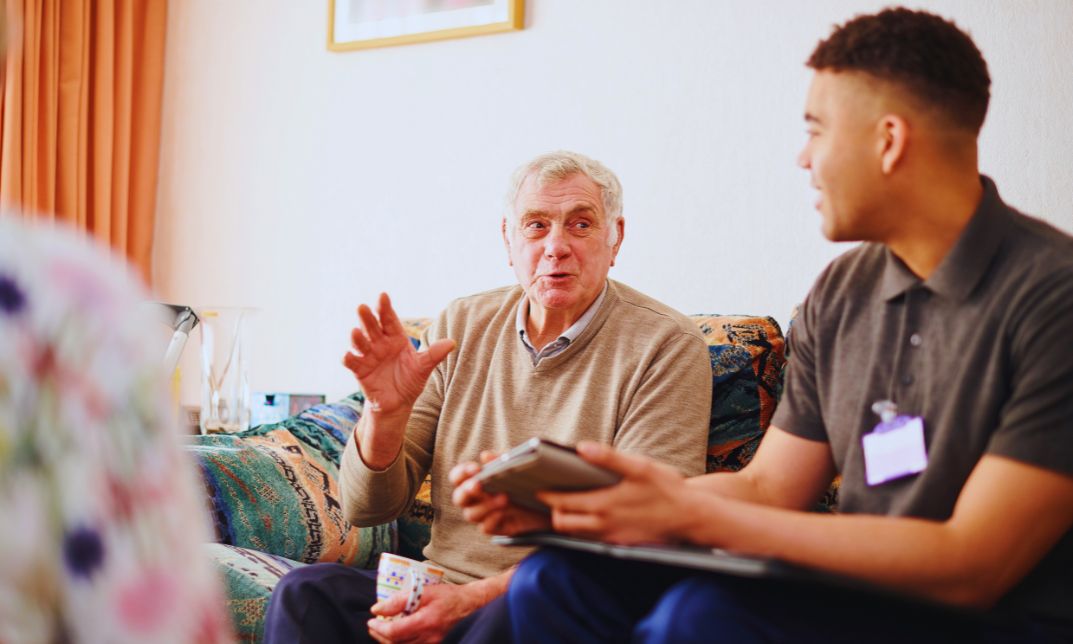Imagine having a trusted sidekick who helps you tackle the tricky parts of every day. That’s exactly what a Mental Health Support Worker (MHSW) does. They are like a superhero friend for people who help people with mental health problems — issues that can make daily life feel hard or confusing. In this piece, we will cover the main duties of mental health support worker in detail.
Along with how they actually help people feel safe, live well, and develop their independence. It’s a job all about trust, kindness, and being there every single day.
What Is a Mental Health Support Worker?
A mental health support worker is part of a big team with doctors, nurses, and therapists. They help people who find school, chores, or friendships hard. Each day, they give support, check feelings, and follow treatment plans like counselling. In addition, they work closely with each person at home or in the community. They help with practical skills and make learning enjoyable. But what exactly is this important function, then?
Their day-to-day work is broken down into a few main areas, which are like the building blocks to help someone get better:
Main Duties of Mental Health Support Worker
A Mental Health Support Worker (MHSW) does many different things to help people live better and feel supported. Their work focuses on building independence, offering emotional support, working with others, and keeping everyone safe. Each of these areas plays an important role in helping a person recover and live a healthy, balanced life.
Helping with Daily Life
An MHSW helps people with everyday tasks such as cooking, cleaning, shopping, or planning their day. These small steps help the person learn new skills and become more confident in managing their own life. The goal is to build independence, so over time the person can rely less on support and feel proud of what they can do on their own.
Being a Listener
A big part of the MHSW’s job is to listen. They take time to talk with the person, offering understanding and kindness. This helps the person open up about their feelings and challenges. By being a good listener, the MHSW helps the person manage stress, sadness, or anxiety, and encourages them to find positive ways to cope with their emotions.
Linking Up the Team
MHSWs often act as a bridge between the person and other people who are helping them, such as doctors, nurses, counsellors, and family members. They make sure everyone shares information and works toward the same goals. This teamwork helps the person get consistent care and ensures that nothing important is missed.
Keeping Everyone Safe
Safety is one of the MHSW’s biggest responsibilities. They make sure the person and their environment are safe, calm, and comfortable. This might mean checking for risks, offering guidance, or creating routines that help the person feel secure. By keeping safety a top priority, the MHSW helps build trust and supports the person’s recovery in a positive and stable way.
Supporting Daily Living and Independence

Let’s start with the basics! MHSWs help people feel independent. This just means being able to look after yourself, like a grown-up! Also, they teach good habits and practical skills, such as:
- Building a Good Day: They help set up a routine, like having regular mealtimes and getting enough sleep.
- House Chores: They might help with cooking simple meals, tidying up, or doing the laundry.
- Money Matters: They help people budget, handle money, and remember appointments.
- Looking After Yourself: They help with washing and getting ready while keeping things private.
Monitoring Mental Health and Emotional Well-being
Next, MHSWs are like super spotters for the care team. Because they watch carefully and listen closely to feelings all the time:
- Spotting Changes: They look out for changes in mood or behaviour, like if someone seems very sad, angry, or much happier than before.
- Finding Triggers: They help the person figure out what things might “set off” their feelings (we call these triggers).
- Calming Down: They help people use coping tools like deep breathing or listening to music to manage anxiety or panic.
- Giving Feedback: This is key! They tell the doctors and therapists what they see, so the person’s plan can be changed if needed.
Helping with Medication and Treatment Plans
The MHSW isn’t a doctor or nurse, but they play an important role in helping the person stay on track with their treatment. This means helping them remember the necessary steps toward recovery:
- Medicine Reminders: They help the client remember to take their medicine at the right time, because this is often a huge part of feeling better.
- Side Effects: They help the person notice if the medicine is causing any problems, like feeling sleepy, and make sure the nurse knows right away.
- Going to Sessions: They help the client get to all their important sessions, like seeing their counsellor or going to support groups.
Working with Families, Nurses, and Therapists
The MHSW is the key since improving oneself is a team effort! They talk to everyone to keep the support smooth and keep everyone updated:
- Team Talks: They work closely with nurses, doctors, and social workers, so everyone is using the same rules and plans.
- Family Connection: They share appropriate information with the client’s family or loved ones (only if the client agrees!) to help them all support the person at home.
- Sharing News: If something good or worrying happens, they quickly tell the other professionals so everyone is up-to-date.
Encouraging Positive Behaviour and Social Skills
It’s not just about the serious stuff! MHSWs help people get back out into the world and feel good about themselves by gently encouraging social skills:
- Fun Activities: They encourage clients to try new community activities, join a club, or start a new hobby.
- Learning Social Skills: They help clients learn how to talk to people, make new friends, and be good at managing relationships well.
- Handling Fights: They teach them how to handle a disagreement or conflict without getting too upset.
- Practising Good Habits: They help the client keep up positive daily routines that make them feel strong and stable.
Keeping Accurate Records and Reports

It’s crucial to put everything in writing! It’s how the entire team is aware of what’s changing and what’s working.
- Daily Diary: They write detailed notes about the day in the client’s file.
- Updating Plans: They help update the client’s care plans so the plan always matches what the person needs now.
- Logging Worries: They write down any time there’s an accident or a serious worry so everyone knows what happened.
- Keeping Secrets: They follow strict rules to keep all personal and health information private and safe.
Promoting Safety and Confidentiality
Safety is the number one rule. MHSWs make sure the environment is secure and that the client feels respected in everything they do:
- Checking for Risks: They help check for anything that could be dangerous (we call this a risk assessment) and make changes if needed.
- Helping Calm Down: They use gentle words and clever ways to help someone calm down if they get very angry or upset. This skill is called “calming a fight”.
- Protection: They follow rules called “protection rules” to protect the person from anyone who might hurt them.
- Respecting Privacy: They always respect each person’s privacy and dignity, showing kindness and care in everything they do.
Skills You Need to Be a Good Mental Health Support Worker

You must be a wonderful person to perform this job properly! You need abilities such as:
- Being Empathetic: This means being able to really understand what it feels like to be them and care deeply.
- Great Communicator: You need to be good at talking clearly and, more importantly, listening well.
- Staying Strong (Resilience): You need to be able to stay calm and happy even when things are difficult.
- Good Observer: Having a sharp eye to spot little changes.
- Fixing Problems: Being able to think fast and come up with good, practical solutions.
- Working with Others: Being a great team player with other staff members.
- Flexibility: Being able to adapt quickly if plans change at the last minute.
How to become a mental health support worker?
A mental health support worker (MHSW) helps people feel safe, supported, and more confident each day. The job is rewarding and makes a real difference. Most roles need a Level 2 qualification in health and social care or mental health awareness. Besides, you could try volunteering with a local charity or maybe get a job as a Healthcare Assistant (HCA) first. Therefore, volunteering or working in residential homes, community centres, or support services gives practical skills and confidence. Employers value patience, empathy, and clear communication.
What About Pay? MHSWs are paid a good starting salary because their job is so important! Salaries in the UK start around £20,000 to £22,000 a year. With experience, pay can rise to £25,000-£30,000 or more.
Discover more about the role and how to start your career here: 5+ skills you need to work as a Mental Health Support Worker
Final Thoughts: Why Mental Health Support Workers Matter
In the end, mental health support workers are everyday heroes. They give people what they need most—stability, routine, and a caring connection with others. Besides, they help people regain independence, find daily support, and live fuller lives. Ultimately, they’re the people who prove that recovery is possible!
Learn the Skills Yourself!
If you want to step into this rewarding role, start with our Level 2 Certificate in Awareness of Mental Health Problems.
FAQs: Mental Health Support Worker Role
- What are the 5 responsibilities of a support worker?
- Provide personal care, assist with daily tasks, support emotional well-being, encourage independence, and maintain records.
- What is the role of a mental health worker?
- Help people manage mental health issues, provide support and guidance, monitor progress, and work with other professionals.
- What are the 5 C’s of mental health?
- Care, Compassion, Communication, Confidence, and Connection.
- What are some activities that help with mental health?
- Exercise, meditation, journaling, socialising, and hobbies.
- What is the key role of a support worker?
- To assist people with daily living and promote their independence and well-being.
- How do you describe your main duties and responsibilities?
- Outline tasks you perform daily, the people you support, and the goals you help achieve.
- What is the basic responsibility of the support staff?
- To provide practical and emotional support to clients or patients.
- What are three qualities of a support worker?
- Empathy, patience, and reliability.
- Can you name 5 key duties of a care assistant?
- Help with personal care, assist with meals, support mobility, monitor health, and keep records.
- What are the five roles of a worker?
- Support, guide, communicate, monitor, and report.
- What are the key skills of a care support worker?
- Communication, empathy, organisation, problem-solving, and teamwork.
- What are the duties and responsibilities of workers?
- Carry out assigned tasks, follow policies, support others, maintain safety, and report issues.




